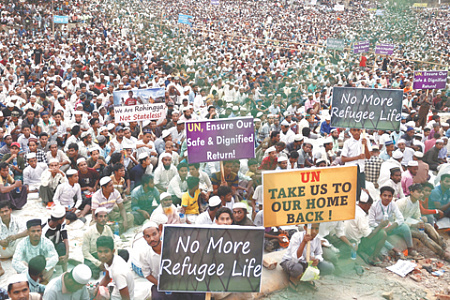
The Rohingya in Bangladesh welcomed the US decision to provide $73 million in financial assistance through UN channels. This was an encouraging signal for almost 1 million refugees of this nationality. After all, after US President Donald Trump announced a reduction in international aid, they were afraid that their food rations would be cut. The fate of the Rohingya remains uncertain, but the preservation of the current regime in Bangladesh has also become uncertain. After the coup in 2024, Islamist radicals became more active there.
UN Secretary-General Antonio Guterres, who visited Bangladesh in March, described in the harshest terms the decrease in aid to the Rohingya from the United States and European countries. He called it a crime. Guterres visits one of the Muslim countries every year during the holy month of Ramadan. As the AP agency reminds, several hundred thousand Rohingya have lived in Bangladesh for many decades. More than 700,000 arrived in 2017. And in 2024, during the fighting between the government forces of Myanmar and the rebels from the so-called Arakan Army, another 70 thousand crossed the border.
The UN will do everything possible to ensure that financial assistance reaches the Rohingya, Guterres stressed. In Dhaka, the country’s capital, the Secretary General met with the Nobel Peace Prize laureate, the head of the interim Government, Muhammad Yunus. The Secretary General expressed concern that aid programs are being cut across the world, and Western powers are increasing military spending at this moment.
Yunus became a popular figure in the West after he developed a microfinance program for small businesses. Its essence is that small loans without collateral are issued at a low interest rate. Yunus was called the banker of the poor. However, in reality, not everything was smooth. The Government of Prime Minister Sheikh Hasina, the daughter of Mujibur Rahman, the founding father of the independent republic, said Yunus had robbed the peasants. The laureate was arrested, but released on bail. Student protests broke out in the country. At first, the army and law enforcement officers silently watched the demonstrators and even allowed them to break into the Prime Minister’s residence and destroy the memorial in honor of Mujibur Rahman, who led the liberation movement of the people of Bangladesh in the late 60s and early 70s of the last century. At that time, the country was part of Pakistan.
Last year’s coup reminded everyone of the ruthless massacre of Mujibur Rahman and his family by the conspirators in 1975. Then a group of officers and lower ranks entered the residence of the father of the nation and shot him, family members and even servants. Sheikh Hasina was in Britain at the time. And now, faced with the wrath of an angry crowd, she flew to India. India, which sent troops to help the Bangladesh rebels in 1971, was a close partner, almost an ally of Bangladesh, before the coup.
Bangladesh has traditionally had friendly relations with Russia. After all, the Soviet Union, by supplying arms and ammunition to India in 1971, contributed to its victory over Pakistan. The author of these lines, as a newspaper correspondent, visited areas liberated from the Pakistanis. The local partisans warmly welcomed the Soviet people.
As you can see, internal upheavals in Bangladesh can affect the balance of power in South Asia. Both the West and China, which is ready to implement projects based on the Belt and Road initiative, would like to maintain their influence in a country with 175 million people. But the question arises: will the Yunus government be able to maintain stability in the young state? After all, Islamist radicals have become more active there. According to The New York Times, a political vacuum has been created after the coup, which can be filled by adherents of religious conservatism.
The extremists began by demanding control over the behavior of women. In one city, they said that women are not allowed to play football. In another city, they forced the police to release from custody a man who had harassed and intimidated a woman in the street, demanding that she cover her head appropriately. And when the man was released, the crowd crowned him with garlands of flowers. A rally was held in Dhaka, where participants said that if the government did not impose the death sentence on a person who expressed disrespect for Islam, they would carry out the sentence themselves. A few days later, the group, declared illegal, held a march under the slogan of creating a “caliphate.”
Representatives of several Islamist parties and groups that were previously banned gave interviews to the media, where they stated that they were seeking the introduction of fundamentalist orders. This is a dangerous shift in the country’s political life, and the West has overlooked it.
How do high-ranking officials feel about this? According to the American newspaper, they are drafting a new Constitution. It probably will not mention secularism as a characteristic feature of the life of the state. The canons of religion will be put at the forefront.
